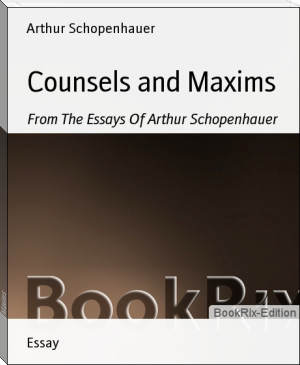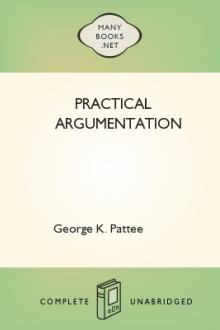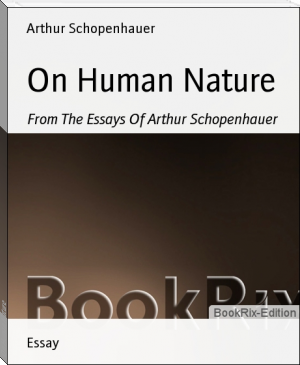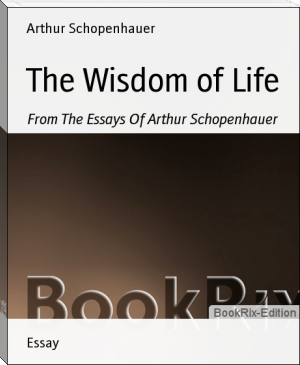Counsels and Maxims, Arthur Schopenhauer [fox in socks read aloud txt] 📗

- Author: Arthur Schopenhauer
Book online «Counsels and Maxims, Arthur Schopenhauer [fox in socks read aloud txt] 📗». Author Arthur Schopenhauer
other pleasures but the gratification of the senses and the delights of society - who have left their minds unenlightened and their faculties unused. It is quite true that the intellectual faculties decline with the approach of old age; but where they were originally strong, there will always be enough left to combat the onslaught of boredom. And then again, as I have said, experience, knowledge, reflection, and skill in dealing with men, combine to give an old man an increasingly accurate insight into the ways of the world; his judgment becomes keen and he attains a coherent view of life: his mental vision embraces a wider range. Constantly finding new uses for his stores of knowledge and adding to them at every opportunity, he maintains uninterrupted that inward process of self-education, which gives employment and satisfaction to the mind, and thus forms the due reward of all its efforts.
All this serves in some measure as a compensation for decreased intellectual power. And besides, Time, as I have remarked, seems to go much more quickly when we are advanced in years; and this is in itself a preventive of boredom. There is no great harm in the fact that a man's bodily strength decreases in old age, unless, indeed, he requires it to make a living. To be poor when one is old, is a great misfortune. If a man is secure from that, and retains his health, old age may be a very passable time of life. Its chief necessity is to be comfortable and well off; and, in consequence, money is then prized more than ever, because it is a substitute for failing strength. Deserted by Venus, the old man likes to turn to Bacchus to make him merry. In the place of wanting to see things, to travel and learn, comes the desire to speak and teach. It is a piece of good fortune if the old man retains some of his love of study or of music or of the theatre, - if, in general, he is still somewhat susceptible to the things about him; as is, indeed, the case with some people to a very late age. At that time of life, what a man has in himself is of greater advantage to him that ever it was before.
There can be no doubt that most people who have never been anything but dull and stupid, become more and more of automata as they grow old. They have always thought, said and done the same things as their neighbors; and nothing that happens now can change their disposition, or make them act otherwise. To talk to old people of this kind is like writing on the sand; if you produce any impression at all, it is gone almost immediately; old age is here nothing but the caput mortuum of life - all that is essential to manhood is gone. There are cases in which nature supplies a third set of teeth in old age, thereby apparently demonstrating the fact that that period of life is a second childhood.
It is certainly a very melancholy thing that all a man's faculties tend to waste away as he grows old, and at a rate that increases in rapidity: but still, this is a necessary, nay, a beneficial arrangement, as otherwise death, for which it is a preparation, would be too hard to bear. So the greatest boon that follows the attainment of extreme old age is euthanasia , - an easy death, not ushered in by disease, and free from all pain and struggle.[1] For let a man live as long as he may, he is never conscious of any moment but the present, one and indivisible; and in those late years the mind loses more every day by sheer forgetfulness than ever it gains anew.
[Footnote 1: See Die Welt als Wille und Vorstellung , Bk. II. ch. 41, for a further description of this happy end to life.]
The main difference between youth and age will always be that youth looks forward to life, and old age to death; and that while the one has a short past and a long future before it, the case is just the opposite with the other. It is quite true that when a man is old, to die is the only thing that awaits him; while if he is young, he may expect to live; and the question arises which of the two fates is the more hazardous, and if life is not a matter which, on the whole, it is better to have behind one than before? Does not the Preacher say:
the day of death [is better] than the day of one's birth .[1] It is certainly a rash thing to wish for long life;[2] for as the Spanish proverb has it, it means to see much evil, - Quien larga vida vive mucho mal vide .
[Footnote 1: Ecclesiastes vii. 1.]
[Footnote 2: The life of man cannot, strictly speaking, be called either long or short , since it is the ultimate standard by which duration of time in regard to all other things is measured.
In one of the Vedic Upanishads (Oupnekhat , II.) the natural length of human life is put down at one hundred years. And I believe this to be right. I have observed, as a matter of fact, that it is only people who exceed the age of ninety who attain euthanasia , - who die, that is to say, of no disease, apoplexy or convulsion, and pass away without agony of any sort; nay, who sometimes even show no pallor, but expire generally in a sitting attitude, and often after a meal, - or, I may say, simply cease to live rather than die. To come to one's end before the age of ninety, means to die of disease, in other words, prematurely.
Now the Old Testament (Psalms xc. 10) puts the limit of human life at seventy, and if it is very long, at eighty years; and what is more noticeable still, Herodotus (i. 32 and iii. 22) says the same thing. But this is wrong; and the error is due simply to a rough and superficial estimate of the results of daily experience. For if the natural length of life were from seventy to eighty years, people would die, about that time, of mere old age. Now this is certainly not the case. If they die then, they die, like younger people, of disease ; and disease is something abnormal. Therefore it is not natural to die at that age. It is only when they are between ninety and a hundred that people die of old age; die, I mean, without suffering from any disease, or showing any special signs of their condition, such as a struggle, death-rattle, convulsion, pallor, - the absence of all which constitutes euthanasia . The natural length of human life is a hundred years; and in assigning that limit the Upanishads are right once more.]
A man's individual career is not, as Astrology wishes to make out, to be predicted from observation of the planets; but the course of human life in general, as far as the various periods of it are concerned, may be likened to the succession of the planets: so that we may be said to pass under the influence of each one of them in turn.
At ten, Mercury is in the ascendant; and at that age, a youth, like this planet, is characterized by extreme mobility within a narrow sphere, where trifles have a great effect upon him; but under the guidance of so crafty and eloquent a god, he easily makes great progress. Venus begins her sway during his twentieth year, and then a man is wholly given up to the love of women. At thirty, Mars comes to the front, and he is now all energy and strength, - daring, pugnacious and arrogant.
When a man reaches the age of forty, he is under the rule of the four Asteroids ; that is to say, his life has gained something in extension. He is frugal; in other words, by the help of Ceres , he favors what is useful; he has his own hearth, by the influence of
Vesta ; Pallas has taught him that which is necessary for him to know; and his wife - his Juno - rules as the mistress of his house.
But at the age of fifty, Jupiter is the dominant influence. At that period a man has outlived most of his contemporaries, and he can feel himself superior to the generation about him. He is still in the full enjoyment of his strength, and rich in experience and knowledge; and if he has any power and position of his own, he is endowed with authority over all who stand in his immediate surroundings. He is no more inclined to receive orders from others; he wants to take command himself. The work most suitable to him now is to guide and rule within his own sphere. This is the point where Jupiter culminates, and where the man of fifty years is at his best.
Then comes Saturn , at about the age of sixty, a weight as of lead , dull and slow: -
But old folks, many feign as they were dead;
Unwieldy, slow, heavy and pale as lead . Last of all, Uranus ; or, as the saying is, a man goes to heaven.
I cannot find a place for Neptune , as this planet has been very thoughtlessly named; because I may not call it as it should be called - Eros . Otherwise I should point out how Beginning and End meet together, and how closely and intimately Eros is connected with Death: how Orcus, or Amenthes, as the Egyptians called him, is not only the receiver but the giver of all things - [Greek: lambanon kai didous]. Death is the great reservoir of Life. Everything comes from Orcus; everything that is alive now was once there. Could we but understand the great trick by which that is done, all would be clear!
Imprint
All this serves in some measure as a compensation for decreased intellectual power. And besides, Time, as I have remarked, seems to go much more quickly when we are advanced in years; and this is in itself a preventive of boredom. There is no great harm in the fact that a man's bodily strength decreases in old age, unless, indeed, he requires it to make a living. To be poor when one is old, is a great misfortune. If a man is secure from that, and retains his health, old age may be a very passable time of life. Its chief necessity is to be comfortable and well off; and, in consequence, money is then prized more than ever, because it is a substitute for failing strength. Deserted by Venus, the old man likes to turn to Bacchus to make him merry. In the place of wanting to see things, to travel and learn, comes the desire to speak and teach. It is a piece of good fortune if the old man retains some of his love of study or of music or of the theatre, - if, in general, he is still somewhat susceptible to the things about him; as is, indeed, the case with some people to a very late age. At that time of life, what a man has in himself is of greater advantage to him that ever it was before.
There can be no doubt that most people who have never been anything but dull and stupid, become more and more of automata as they grow old. They have always thought, said and done the same things as their neighbors; and nothing that happens now can change their disposition, or make them act otherwise. To talk to old people of this kind is like writing on the sand; if you produce any impression at all, it is gone almost immediately; old age is here nothing but the caput mortuum of life - all that is essential to manhood is gone. There are cases in which nature supplies a third set of teeth in old age, thereby apparently demonstrating the fact that that period of life is a second childhood.
It is certainly a very melancholy thing that all a man's faculties tend to waste away as he grows old, and at a rate that increases in rapidity: but still, this is a necessary, nay, a beneficial arrangement, as otherwise death, for which it is a preparation, would be too hard to bear. So the greatest boon that follows the attainment of extreme old age is euthanasia , - an easy death, not ushered in by disease, and free from all pain and struggle.[1] For let a man live as long as he may, he is never conscious of any moment but the present, one and indivisible; and in those late years the mind loses more every day by sheer forgetfulness than ever it gains anew.
[Footnote 1: See Die Welt als Wille und Vorstellung , Bk. II. ch. 41, for a further description of this happy end to life.]
The main difference between youth and age will always be that youth looks forward to life, and old age to death; and that while the one has a short past and a long future before it, the case is just the opposite with the other. It is quite true that when a man is old, to die is the only thing that awaits him; while if he is young, he may expect to live; and the question arises which of the two fates is the more hazardous, and if life is not a matter which, on the whole, it is better to have behind one than before? Does not the Preacher say:
the day of death [is better] than the day of one's birth .[1] It is certainly a rash thing to wish for long life;[2] for as the Spanish proverb has it, it means to see much evil, - Quien larga vida vive mucho mal vide .
[Footnote 1: Ecclesiastes vii. 1.]
[Footnote 2: The life of man cannot, strictly speaking, be called either long or short , since it is the ultimate standard by which duration of time in regard to all other things is measured.
In one of the Vedic Upanishads (Oupnekhat , II.) the natural length of human life is put down at one hundred years. And I believe this to be right. I have observed, as a matter of fact, that it is only people who exceed the age of ninety who attain euthanasia , - who die, that is to say, of no disease, apoplexy or convulsion, and pass away without agony of any sort; nay, who sometimes even show no pallor, but expire generally in a sitting attitude, and often after a meal, - or, I may say, simply cease to live rather than die. To come to one's end before the age of ninety, means to die of disease, in other words, prematurely.
Now the Old Testament (Psalms xc. 10) puts the limit of human life at seventy, and if it is very long, at eighty years; and what is more noticeable still, Herodotus (i. 32 and iii. 22) says the same thing. But this is wrong; and the error is due simply to a rough and superficial estimate of the results of daily experience. For if the natural length of life were from seventy to eighty years, people would die, about that time, of mere old age. Now this is certainly not the case. If they die then, they die, like younger people, of disease ; and disease is something abnormal. Therefore it is not natural to die at that age. It is only when they are between ninety and a hundred that people die of old age; die, I mean, without suffering from any disease, or showing any special signs of their condition, such as a struggle, death-rattle, convulsion, pallor, - the absence of all which constitutes euthanasia . The natural length of human life is a hundred years; and in assigning that limit the Upanishads are right once more.]
A man's individual career is not, as Astrology wishes to make out, to be predicted from observation of the planets; but the course of human life in general, as far as the various periods of it are concerned, may be likened to the succession of the planets: so that we may be said to pass under the influence of each one of them in turn.
At ten, Mercury is in the ascendant; and at that age, a youth, like this planet, is characterized by extreme mobility within a narrow sphere, where trifles have a great effect upon him; but under the guidance of so crafty and eloquent a god, he easily makes great progress. Venus begins her sway during his twentieth year, and then a man is wholly given up to the love of women. At thirty, Mars comes to the front, and he is now all energy and strength, - daring, pugnacious and arrogant.
When a man reaches the age of forty, he is under the rule of the four Asteroids ; that is to say, his life has gained something in extension. He is frugal; in other words, by the help of Ceres , he favors what is useful; he has his own hearth, by the influence of
Vesta ; Pallas has taught him that which is necessary for him to know; and his wife - his Juno - rules as the mistress of his house.
But at the age of fifty, Jupiter is the dominant influence. At that period a man has outlived most of his contemporaries, and he can feel himself superior to the generation about him. He is still in the full enjoyment of his strength, and rich in experience and knowledge; and if he has any power and position of his own, he is endowed with authority over all who stand in his immediate surroundings. He is no more inclined to receive orders from others; he wants to take command himself. The work most suitable to him now is to guide and rule within his own sphere. This is the point where Jupiter culminates, and where the man of fifty years is at his best.
Then comes Saturn , at about the age of sixty, a weight as of lead , dull and slow: -
But old folks, many feign as they were dead;
Unwieldy, slow, heavy and pale as lead . Last of all, Uranus ; or, as the saying is, a man goes to heaven.
I cannot find a place for Neptune , as this planet has been very thoughtlessly named; because I may not call it as it should be called - Eros . Otherwise I should point out how Beginning and End meet together, and how closely and intimately Eros is connected with Death: how Orcus, or Amenthes, as the Egyptians called him, is not only the receiver but the giver of all things - [Greek: lambanon kai didous]. Death is the great reservoir of Life. Everything comes from Orcus; everything that is alive now was once there. Could we but understand the great trick by which that is done, all would be clear!
Imprint
Publication Date: 05-21-2008
All Rights Reserved
Free e-book «Counsels and Maxims, Arthur Schopenhauer [fox in socks read aloud txt] 📗» - read online now
Similar e-books:





Comments (0)